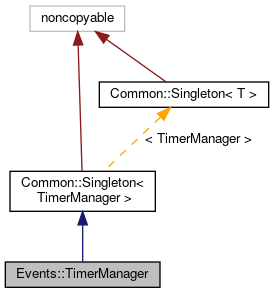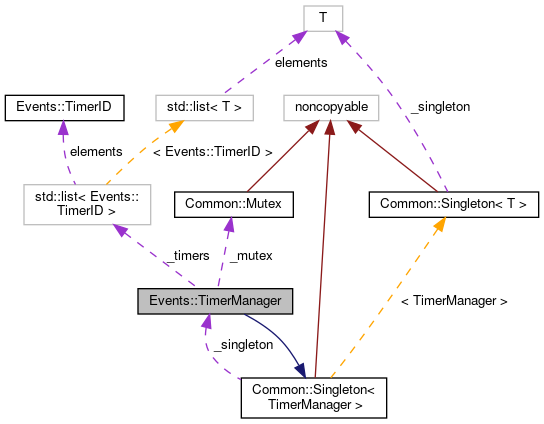The global timer manager. More...
#include <timerman.h>


Public Member Functions | |
| TimerManager () | |
| ~TimerManager () | |
| void | init () |
| void | addTimer (uint32 interval, TimerHandle &handle, const TimerFunc &func) |
| Add a function to be called regularly. More... | |
| void | removeTimer (TimerHandle &handle) |
| Remove that timer function. More... | |
Private Member Functions | |
| void | removeTimer (TimerID &id) |
Static Private Member Functions | |
| static uint32 | timerCallback (uint32 interval, void *data) |
Private Attributes | |
| Common::Mutex | _mutex |
| std::list< TimerID > | _timers |
Additional Inherited Members | |
 Static Public Member Functions inherited from Common::Singleton< TimerManager > Static Public Member Functions inherited from Common::Singleton< TimerManager > | |
| static TimerManager & | instance () |
| static void | destroy () |
 Protected Types inherited from Common::Singleton< TimerManager > Protected Types inherited from Common::Singleton< TimerManager > | |
| typedef TimerManager | SingletonBaseType |
 Protected Member Functions inherited from Common::Singleton< TimerManager > Protected Member Functions inherited from Common::Singleton< TimerManager > | |
| Singleton () | |
| virtual | ~Singleton () |
Detailed Description
The global timer manager.
Allows registering functions to be called at specific intervals.
Definition at line 59 of file timerman.h.
Constructor & Destructor Documentation
◆ TimerManager()
| Events::TimerManager::TimerManager | ( | ) |
Definition at line 41 of file timerman.cpp.
◆ ~TimerManager()
| Events::TimerManager::~TimerManager | ( | ) |
Definition at line 44 of file timerman.cpp.
References _timers, and removeTimer().

Member Function Documentation
◆ addTimer()
| void Events::TimerManager::addTimer | ( | uint32 | interval, |
| TimerHandle & | handle, | ||
| const TimerFunc & | func | ||
| ) |
Add a function to be called regularly.
- Parameters
-
interval The interval in ms. The granularity is platform-dependent. The most common number is 10ms. handle The timer handle to use. func The function to call.
Definition at line 52 of file timerman.cpp.
References Events::TimerHandle::_empty, Events::TimerHandle::_iterator, _mutex, _timers, removeTimer(), and timerCallback().

◆ init()
| void Events::TimerManager::init | ( | ) |
Definition at line 49 of file timerman.cpp.
◆ removeTimer() [1/2]
| void Events::TimerManager::removeTimer | ( | TimerHandle & | handle | ) |
Remove that timer function.
Definition at line 77 of file timerman.cpp.
References Events::TimerHandle::_empty, Events::TimerHandle::_iterator, _mutex, and _timers.
Referenced by addTimer(), and ~TimerManager().

◆ removeTimer() [2/2]
|
private |
Definition at line 91 of file timerman.cpp.
◆ timerCallback()
Definition at line 98 of file timerman.cpp.
References Events::TimerHandle::_empty, Events::TimerHandle::_iterator, and TimerMan.
Referenced by addTimer().

Member Data Documentation
◆ _mutex
|
private |
Definition at line 79 of file timerman.h.
Referenced by addTimer(), and removeTimer().
◆ _timers
|
private |
Definition at line 81 of file timerman.h.
Referenced by addTimer(), removeTimer(), and ~TimerManager().
The documentation for this class was generated from the following files:
- src/events/timerman.h
- src/events/timerman.cpp
 1.8.14
1.8.14